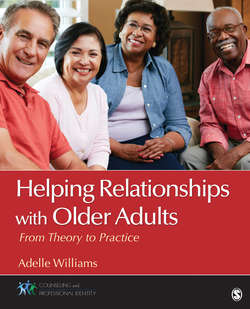Читать книгу Helping Relationships With Older Adults - Adelle M. Williams - Страница 84
На сайте Литреса книга снята с продажи.
Developing New Perspectives, Attitudes, and Knowledge
ОглавлениеChanging demographics are encouraging counselors to seek answers to support the older population. As a person ages, psychological issues increase in breadth and depth. They broaden to include physical health, economic factors, familial loss, decrease in independence, and many more. Issues deepen from the perspective that any psychological problems that remained unresolved earlier in the life span will increase in intensity when facing the issue of mortality. Working in the preventative mode, counselors are provided the opportunity to offer the older client a variety of intrapersonal and network interventions. Locating, exploring, and using available outside networks are perhaps the most essential interventions a counselor can offer to the older client.
Another component of the changing perspective of the counseling field is the growing age of counselors themselves. Not only are counselors presented with issues of the older client, but they are facing their own changing demographics. The majority of university counselor educators who joined the field in the early to mid-1960s and who currently train and lead the profession are growing older. In looking toward retirement, these counselors are developing a deeper empathy with the older generation and a vested interest in supporting their needs.
As members of the baby boomer generation move beyond 65, much of what mental health professionals know about how to treat their concerns become obsolete (American Psychological Association [APA], 2003; Langer, 2009). A survey by the American Psychological Association (2004) found that almost 70% of psychologists work with adults over 65, but only 30% received graduate training for this demographic, and only 20% worked with older adults in a practicum or internship setting. Therefore, these individuals as well as students and early-career professionals are urged to take the necessary steps to prepare themselves to work with this population. Mental health counselors have a responsibility to acknowledge stereotypes and validate older adults’ experiences, but they must also be able to provide accurate information about normative development so that older adults can base their self-assessments on facts rather than myths or unrealistic expectations (Walters & Boyd, 2009).
When working with older adults, mental health counselors are in a unique position to foster positive expressions in their clients. Physiological, psychological, and social/relational factors are all important dimensions of the aging process. Lack of knowledge about normative physiological changes that accompany aging, combined with stereotypes may cause older adults to feel abnormal and internalize feelings of inferiority that will negatively impact the helping relationship. Helping professionals need to address clients in an unbiased and nondiscriminatory manner, allowing older adults a comfortable environment to express their concerns.
It is important for counselors to continue to develop their knowledge, attitude, and skills including self-awareness, so that they can counsel older adults on a variety of issues. Staying aware of the older adult client as a unique individual with a combination of racial, ethnic, gender, sexual orientation, cultural, religious, and socioeconomic identities will prevent professional and emerging practitioners from viewing the client primarily in terms of age (Zeiss & Kasl-Godley, 2001). This awareness will further develop the client–counselor relationship.
Many factors, such as coping mechanisms, influence how older persons address changes in later life. Coping has been defined as a person’s “cognitive and behavioral efforts to manage (reduce, minimize, master, or tolerate) the internal and external demands of the person—environment transaction that is appraised as taxing or exceeding the resources of the person” (Folkman, Lazarus, Gruen, & DeLongis, 1986, p. 572). Adaptive coping, or managing the demands of life relatively well, is at the heart of achieving and maintaining optimal health and wellness. This is certainly true at any age, but perhaps even more so in old age, when the threat of overtaxed resources and the need to tolerate limitations become inevitable. Life involves gains and losses; it is naïve to assume that everyone can and will maintain a high quality of life right up to their death. On the other hand, unnecessarily pessimistic views of old age, fueled by negative stereotypes of the elderly, restrict the ways people choose to adapt to aging and limit their sense of control over their lives.
Helpers who are knowledgeable about and skilled in understanding coping mechanisms can promote healthy adaptation, regardless of client age. Sources of concrete information about how to cope with getting older, how to understand the perspective of elders (Pipher, 1999), and how to deal with dementia can help clinicians build their foundations of knowledge. Whitbourne (1989) summarizes the task:
The main point that a clinician must keep foremost in mind, when working with an aging client, is the need to be flexible. The aging process involves multiple physical, psychological, and social demands that can all potentially impact on the individual’s ability to function. Clinicians may be called upon to perform advocacy services, environmental interventions, and interdisciplinary consultations, which they would not ordinarily regard as falling within the domain of “psychotherapy.” It is only by maintaining an open approach to the multiple needs of the aged client that the clinician can hope to bring about successful change. Helping professionals assume multiple roles when working with older clients and should remain open and flexible in their encounters. (p. 168)
